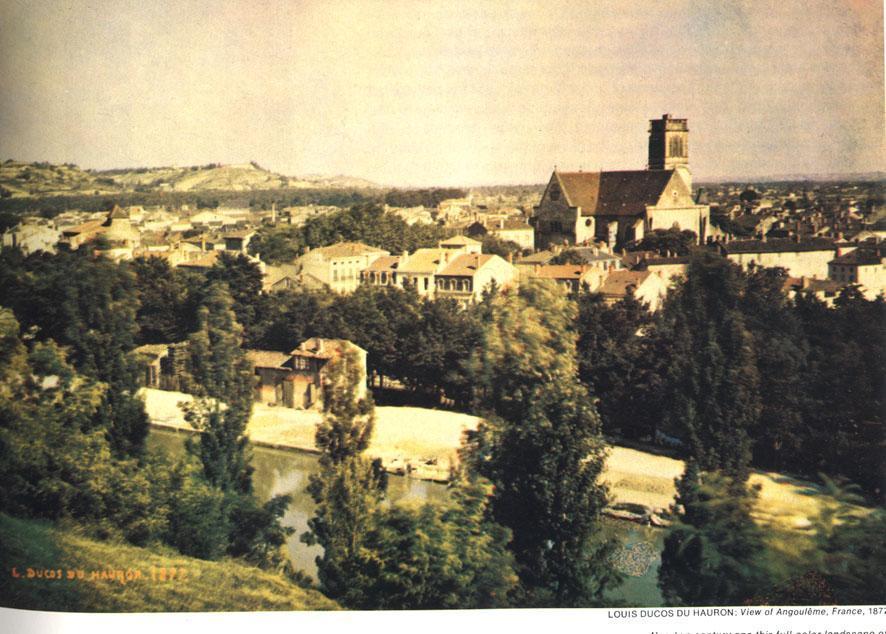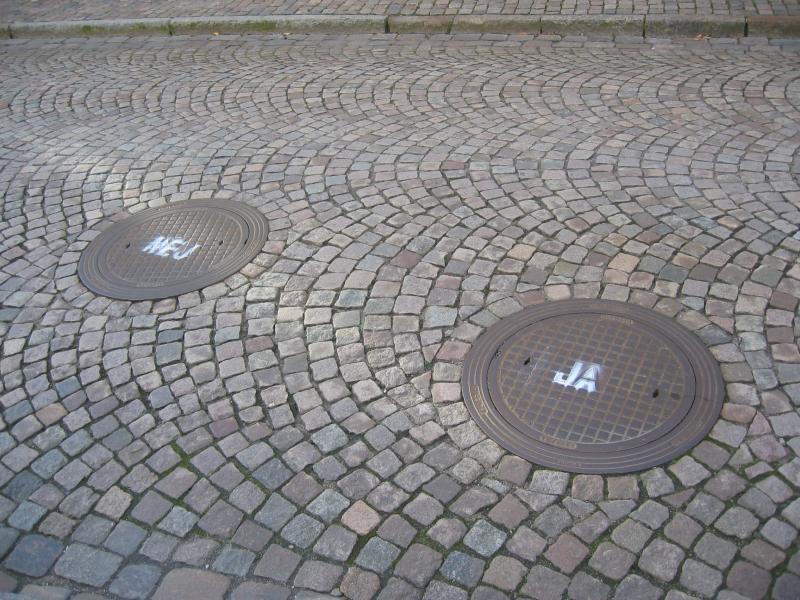Taken almost 50 years before the used method was perfected for commercial use. More info here.
Month: March 2005
Molly Bloom’s Night

We have just arrived from the Forum Metropolitano’s Theatre. We’ve seen the play “Molly
Bloom’s Night”, a one hour and ten minutes monologue based in the last chapter of Joice’s Ulysses. An impressive performance of Magüi Mira, combining moments of humor with very dramatic ones. The play was adapted and directed by José Sanchís Sinisterra.
Pictures from the past: Euro Referendum in Sweden
Free Software Projects web pages: Wiki or other kind of CMS?
The website of the Hula project, recently announced by Novell (Ximian), is powered by MediaWiki (the Wiki software developed for the projects of the Wikimedia Foundation). The Mono project website, also hosted by Novell, has just been migrated to MediaWiki. Is this creating a new tendency (the use of Wiki-like sites instead of more classical, centrally administrated, CMS software), or is just a concrete decision for a couple of related projects.
What’s the real difference between wiki software (MediaWiki, Twiki), and more “classical” CMS software (Drupal, eZ Publish). Couldn’t we configure the Twiki in order to imitate a standard Drupal configuration? Wouldn’t we be able to configure eZ Publish with a template such that any published story has an Edit button immediately connected to the form where we can modify that story? In the end both approaches are developing content management software, and the key differences are: the ease of installation, configuration (how far away is the standard configuration from what we need) and use; the support for a lot of concurrent users (performance), and the features provided by the available modules (potential functionality).
And the fact is that probably all kinds of CMS software are moving towards some mix of functionality that is a closure of the features of all of them in their origin.
Guadec 2006 in Barcelona?

Today I have known about the campaign in favor of celebrating the next Guadec 2006 in Barcelona. It seems to me a nice idea. Barcelona is a comfortable and gorgeous city, well communicated, and a considerable amount of people, companies and institutions are already supporting the candidacy. I guess the final decision will be made in a few months in Stuttgart, but I haven’t heard about any other more or less formal candidacy yet.
The Catholic Church against “The da Vinci Code”
It’s quite shocking the effort that the Catholic Church is putting in fighting what they call the lies inside the best-seller “The da Vinci Code”.
In my opinion the book is just a very addictive, entertaining and enjoyable piece of quite simple literature, which makes the reader reflect a bit on the elimination of the feminine side in most of the theories of the Catholic Church. The main discussion should not be if Jesus had descendents, but rather if the role of women in general should have been much more important both in the history and the present of the institution. Well, nothing really very different to what happened and still happens in the rest of the society.
Guadec-es 2005: Want to be sponsor?
We are looking for organizations wanting to be sponsors of the II Guadec-es. If you have some funding and want to support the event, please write to patrocinio@guadec-es.org. The main names in the Spanish speaking Gnome community are expected to participate in the three days conference, and the coverage in the media it is already being very broad.
Guadec-es 2005: Extended Deadline
We have announced today an extended deadline for the people planning to submit papers or tutorials to the II Guadec-es, the Spanish speaking version of the Guadec. The new deadline is the 27th of March. So if you can speak Spanish and have something interesting to tell related to the Gnome project, please go and write your paper or tutorial proposal right now! 🙂
Richard M. Stallman in Corunha?
It’s still just a well-founded rumour, but it seems that RMS is coming to Corunha to give a talk in the Faculty of Computer Science, and the unconfirmed date would be the 2nd of May.
It can be a nice opportunity to attend one of his disertations on the principles of the Free Software Moviment.
The pity is that I’ve already seen some of his presentations on the Internet, and I can imagine that the content of this one will be quite similar. One of my favourites is the talk given in Porto Alegre in 2000, which I think summarizes in two hours all the Stallman ideas related to software and society.
A new step towards Software Patents in Europe
A sad day for democracy (even for representative democracy). A sad day for Free(dom) Software.
The European Council Presidency has just adopted the “Software Patent Agreement”. The proposal had already been voted before in the Council, with the abstention of Austria, Belgium and Italy, and Spain as the only negative vote, and it was now again in the agenda as an A-item (non discussion topics).
Despite of the efforts carried out by some of the members (Denmark, Poland and Portugal, among others) trying to move the agreement to the list of B-items (discussion topics), the Presidency (Luxembourg) claimed it was not possible due to procedural and practical reasons. Some countries decided to submit written texts (explaining their disagreement) together with the proposal to the European Parliament, but finally the list of A-items was accepted by the whole Council without discussing or voting again.
In the next three months, the European Parliament will vote the proposal, needing the negative votes of the majority of the members in order to be rejected. Any amendment should be approved by the majority, also.
In the past, the European Parliament had already opposed to software patents, requesting to the Council the avoidance of any low allowing them. The Council, ignoring the request of the Parliament, created a proposal, in May 2004, which allows to patent “computer made inventions”, a subtle way of defining which finally is a patent on software algorithms.
If this is the normal behavior of the Council, and this is the kind of institutions that the European Constitution legitimates, we can start to think in running away from *this* version of Europe.


